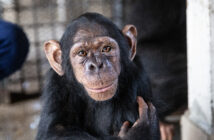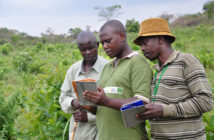As one of humanity’s closest living relatives, chimpanzees give us an amazing insight into our own lives and history. This is one reason why fascinating studies focused on chimpanzees continue to be published year after year. Below is a roundup of scientific articles that have been published recently.
Electrocardiogram reference intervals for clinically normal wild-born chimpanzees…
As with humans, heart disease is a health issue common in chimpanzees. In fact, it is a leading cause of death in captive chimpanzees. Recently, a study that looked at heart disease in captive chimps was undertaken by Rebeca Atencia, the Jane Goodall Institute’s Executive Director of JGI-Congo, and three researchers from Cardiff University, Luis Revuelta, John D. Somauroo, and Robert E. Shave.
Much of the information in these papers was gathered at the Jane Goodall Institute’s Tchimpounga Sanctuary in the Republic of Congo, where there are over 160 chimpanzees living in captivity in a sanctuary setting. Learn what the team found out by reading about the study here.
Chimp puberty helps recalculate when chimps and humans split…
A recent study conducted by researchers from Columbia University explored the possibility that the timing of puberty and other life events and how they affect genetics may give humans a better estimate as to when chimpanzees and humans split and continued on their own evolutionary paths.
While estimates for when the chimp-human split occurred range from 3 to 10 million years ago, this study find that the split likely occurred closer to 6 million years ago, aligning with evidence from fossil records. Read more about the study and its conclusions here.
Reward currency modulates human risk preferences…
As noted by researchers Alexandra G. Rosati of Harvard University and Brian Hare of Duke University, exploring the relationship between decision-making and rewards often entails monetary rewards in studies on humans and food rewards in studies focusing on non-humans. In this study, the researchers decided to examine how human risk preferences for food and other non-monetary rewards compare with our closest relatives, chimpanzees and bonobos.
The study showed that humans were more risk-seeking when being offered non-monetary rewards, such as food, than they were when money was on the table. It also showed that humans and chimpanzees are bigger risk-seekers than bonobos. To read more about these results, click here.





